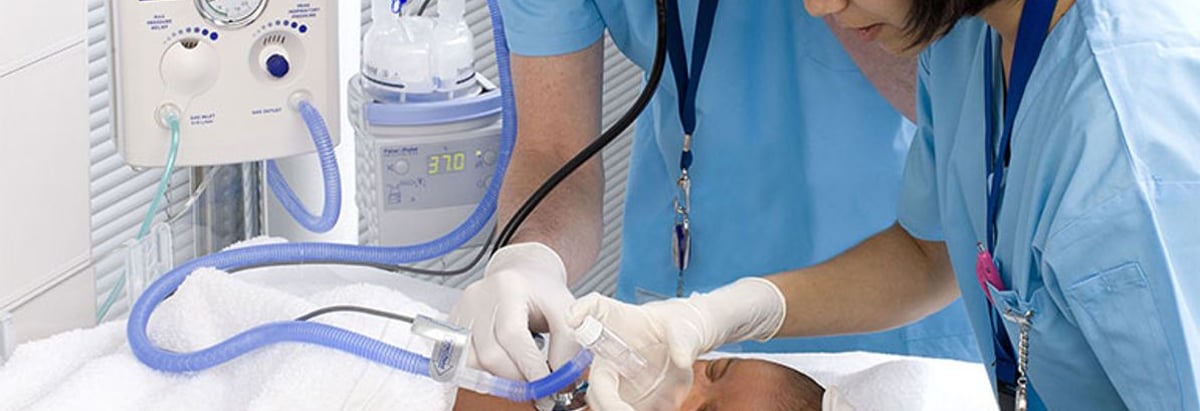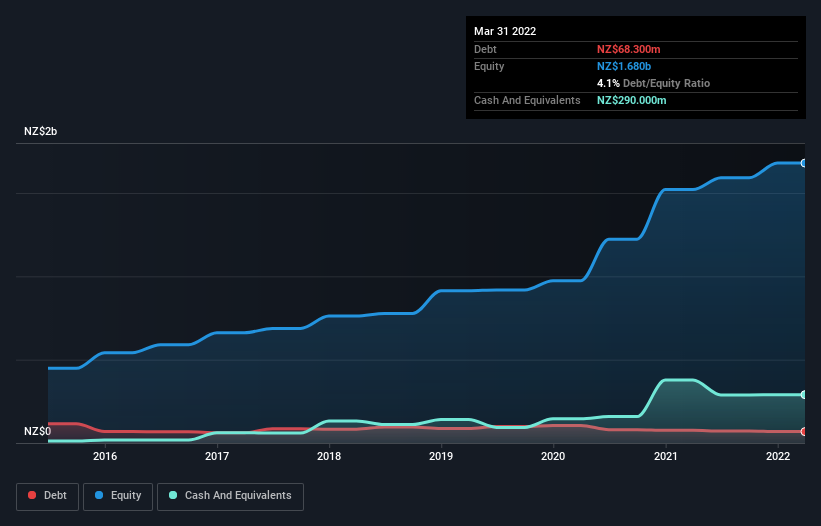- New Zealand
- /
- Medical Equipment
- /
- NZSE:FPH
Fisher & Paykel Healthcare (NZSE:FPH) Seems To Use Debt Quite Sensibly

Warren Buffett famously said, 'Volatility is far from synonymous with risk.' So it might be obvious that you need to consider debt, when you think about how risky any given stock is, because too much debt can sink a company. We can see that Fisher & Paykel Healthcare Corporation Limited (NZSE:FPH) does use debt in its business. But the real question is whether this debt is making the company risky.
When Is Debt Dangerous?
Generally speaking, debt only becomes a real problem when a company can't easily pay it off, either by raising capital or with its own cash flow. In the worst case scenario, a company can go bankrupt if it cannot pay its creditors. However, a more common (but still painful) scenario is that it has to raise new equity capital at a low price, thus permanently diluting shareholders. Having said that, the most common situation is where a company manages its debt reasonably well - and to its own advantage. When we examine debt levels, we first consider both cash and debt levels, together.
Check out our latest analysis for Fisher & Paykel Healthcare
How Much Debt Does Fisher & Paykel Healthcare Carry?
The image below, which you can click on for greater detail, shows that Fisher & Paykel Healthcare had debt of NZ$68.3m at the end of March 2022, a reduction from NZ$76.1m over a year. However, it does have NZ$290.0m in cash offsetting this, leading to net cash of NZ$221.7m.

How Healthy Is Fisher & Paykel Healthcare's Balance Sheet?
According to the last reported balance sheet, Fisher & Paykel Healthcare had liabilities of NZ$303.9m due within 12 months, and liabilities of NZ$123.4m due beyond 12 months. Offsetting these obligations, it had cash of NZ$290.0m as well as receivables valued at NZ$182.7m due within 12 months. So it can boast NZ$45.4m more liquid assets than total liabilities.
Having regard to Fisher & Paykel Healthcare's size, it seems that its liquid assets are well balanced with its total liabilities. So it's very unlikely that the NZ$11.7b company is short on cash, but still worth keeping an eye on the balance sheet. Simply put, the fact that Fisher & Paykel Healthcare has more cash than debt is arguably a good indication that it can manage its debt safely.
It is just as well that Fisher & Paykel Healthcare's load is not too heavy, because its EBIT was down 29% over the last year. When it comes to paying off debt, falling earnings are no more useful than sugary sodas are for your health. There's no doubt that we learn most about debt from the balance sheet. But ultimately the future profitability of the business will decide if Fisher & Paykel Healthcare can strengthen its balance sheet over time. So if you want to see what the professionals think, you might find this free report on analyst profit forecasts to be interesting.
Finally, while the tax-man may adore accounting profits, lenders only accept cold hard cash. While Fisher & Paykel Healthcare has net cash on its balance sheet, it's still worth taking a look at its ability to convert earnings before interest and tax (EBIT) to free cash flow, to help us understand how quickly it is building (or eroding) that cash balance. In the last three years, Fisher & Paykel Healthcare's free cash flow amounted to 47% of its EBIT, less than we'd expect. That weak cash conversion makes it more difficult to handle indebtedness.
Summing up
While it is always sensible to investigate a company's debt, in this case Fisher & Paykel Healthcare has NZ$221.7m in net cash and a decent-looking balance sheet. So we don't have any problem with Fisher & Paykel Healthcare's use of debt. The balance sheet is clearly the area to focus on when you are analysing debt. But ultimately, every company can contain risks that exist outside of the balance sheet. For example - Fisher & Paykel Healthcare has 1 warning sign we think you should be aware of.
At the end of the day, it's often better to focus on companies that are free from net debt. You can access our special list of such companies (all with a track record of profit growth). It's free.
New: AI Stock Screener & Alerts
Our new AI Stock Screener scans the market every day to uncover opportunities.
• Dividend Powerhouses (3%+ Yield)
• Undervalued Small Caps with Insider Buying
• High growth Tech and AI Companies
Or build your own from over 50 metrics.
Have feedback on this article? Concerned about the content? Get in touch with us directly. Alternatively, email editorial-team (at) simplywallst.com.
This article by Simply Wall St is general in nature. We provide commentary based on historical data and analyst forecasts only using an unbiased methodology and our articles are not intended to be financial advice. It does not constitute a recommendation to buy or sell any stock, and does not take account of your objectives, or your financial situation. We aim to bring you long-term focused analysis driven by fundamental data. Note that our analysis may not factor in the latest price-sensitive company announcements or qualitative material. Simply Wall St has no position in any stocks mentioned.
About NZSE:FPH
Fisher & Paykel Healthcare
Designs, manufactures, markets, and sells medical device products and systems in North America, Europe, the Asia Pacific, and internationally.
Flawless balance sheet with reasonable growth potential.


